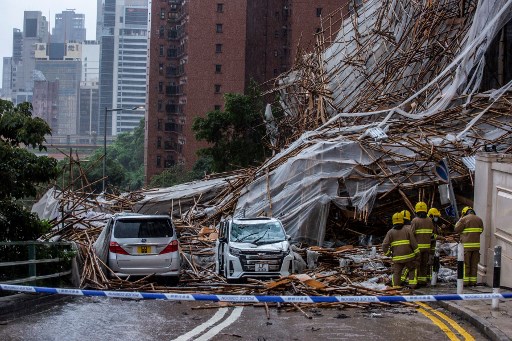
HONG KONG, China (AFP) — Hong Kong battened down on Tuesday evening for the second time in less than a week as an approaching tropical storm prompted forecasters to raise their alert level and trigger safety measures.
Tropical Cyclone Kompasu — named after the Japanese pronunciation of “compass” — is the second major storm to threaten the international business hub with torrential rain and high winds in five days.
As of 0900 GMT it was 480 kilometres to the south of Hong Kong packing winds of up to 110 kilometres per hour.
Hong Kong’s Observatory issued a T8 — its third highest storm warning — at 5.22pm (0922 GMT), although skies were clear at the time.
The order stopped ferries and many bus routes from operating, although the city’s subway system continued running.
Schools had already sent students home earlier in the day ahead of the order, with many offices following suit.
On Saturday forecasters also declared a T8 warning when the outskirts of another tropical storm, dubbed Lionrock, pounded the city with torrential downpours and high winds.
Although the epicentre of that storm remained hundreds of kilometres to the south of Hong Kong the T8 warning lasted for 22 hours, the longest typhoon signal since 1978, bringing some 460 mm of rain over two days.
Many residents were taken by surprise at the ferocity of Lionrock, which first began battering the city with heavy rain on Friday.
One woman was killed on Friday morning when some 30 stories of bamboo scaffolding surrounding one of Hong Kong’s many towering housing blocks collapsed in the high winds and tumbled onto a winding hillside road below.
Hong Kong’s Observatory came under fire for not issuing a T8 earlier, however forecasters said the winds had not picked up to the speed where such a warning was warranted.
The facility added that storms like Lionrock were becoming harder to predict and model for, partly because of climate change.
“It was a very special case,” observatory director Cheng Cho-ming told reporters. “In terms of predicting such an extreme situation, it was very difficult.”
Scientists have long warned that typhoons are becoming more powerful, and strengthening more rapidly, as the world becomes warmer because of man-made climate change.
Social media filled with images of empty supermarket shelves on Tuesday as Hong Kongers stocked up ahead of Kompasu’s arrival after supplies were already disrupted by the week’s previous storm.
© Agence France-Presse








